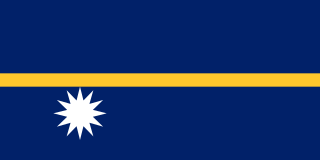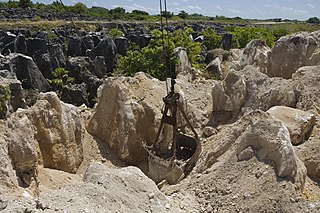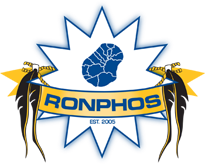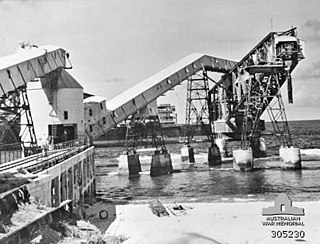
Nauru, officially the Republic of Nauru and formerly known as Pleasant Island, is an island country and microstate in Micronesia, part of the Oceania region in the Central Pacific. Its nearest neighbour is Banaba of Kiribati about 300 km (190 mi) to the east.

History of Nauru, is about Nauru, an island country in the Pacific Ocean. Human activity is thought to have begun roughly 3,000 years ago when clans settled the island. A people and culture developed on the island, the Nauru which had 12 tribes. At the end of the 1700s, a British ship came, and this was the first known contact with the outside world. The British ship called it "pleasant island" and it was a friendly greeting; the British sailed on. Thirty years later, in 1830, an escaped Irish convict took over the island and was finally evicted in 1841. There were scattered interactions with passing vessels and trade. In the mid-to-late 19th century, a devastating civil war started, which took the lives of many Nauru. This war was ended when Germany annexed the island in 1888, and negotiations ended the fighting. In the 1900s, phosphate mining started, and the Germans built some modern facilities on the island. German control ended at the end of World War I, and it was passed to Australia as protectorate. This continued until WW2, when the Empire of Japan invaded the island. Although it was occupied for a few years, many Nauru died at this time, and much of the population was deported from the island and/or used for slave labor. With the surrender of Japan, the Nauru were returned to the island, and it was put under Australian administration again, under the condition it would become independent. This happened in 1968, and Nauru has been a stable democracy since that time. In the last three decades of the 20th century, Nauru had enormous per capita wealth from the phosphate mining, to the point they were some of the richest people on the planet. However, when this ended and the investments were depleted, it has had a harder time, and international aid is important in the 21st century.

The politics of Nauru take place in a framework of a parliamentary representative democratic republic, whereby the President of Nauru is the head of government of the executive branch. Legislative power is vested in both the government and the parliament. The Judiciary is independent of the executive and the legislature.

The economy of Nauru is tiny, based on a population in 2019 of only 11,550 people. The economy has historically been based on phosphate mining. With primary phosphate reserves exhausted by the end of the 2010s, Nauru has sought to diversify its sources of income. In 2020, Nauru's main sources of income were the sale of fishing rights in Nauru's territorial waters, and revenue from the Regional Processing Centre.

Brigadoon is a musical with a book and lyrics by Alan Jay Lerner, and music by Frederick Loewe. The song "Almost Like Being in Love", from the musical, has become a standard. It features two American tourists who stumble upon Brigadoon, a mysterious Scottish village that appears for only one day every 100 years. Tommy, one of the tourists, falls in love with Fiona, a young woman from Brigadoon.

The Phantom of the Opera is a musical by Andrew Lloyd Webber, lyrics by Charles Hart, additional lyrics by Richard Stilgoe, and a libretto by Lloyd Webber and Stilgoe. Based on the novel by Gaston Leroux, it tells the tragic story of beautiful soprano Christine Daaé, who becomes the obsession of a mysterious and disfigured musical genius living in the subterranean labyrinth beneath the Paris Opéra House.

Denigomodu is a district in the western part of the island of Nauru. It is the most populous district in Nauru.

The Republic of Nauru Phosphate Corporation (RONPhos) is a government-owned company controlling phosphate mining in Nauru. The company was previously known as the Nauru Phosphate Corporation (NPC).

The displacement of the traditional culture of Nauru by contemporary western influences is evident on the island. Little remains from the old customs. The traditions of arts and crafts are nearly lost.

Lisa McCune is an Australian actress, known for her role in TV series Blue Heelers as Senior Constable Maggie Doyle, and in Sea Patrol as Lieutenant Kate McGregor RAN. She has won four Gold Logie Awards.

Aida is a musical based on the opera of the same name written by Antonio Ghislanzoni with music by Giuseppe Verdi. It has music by Elton John, lyrics by Tim Rice, and book by Linda Woolverton, Robert Falls, and David Henry Hwang, and was originally produced by Hyperion Theatricals.

Nine is a musical initiated by and with music and lyrics by Maury Yeston and a book by Arthur Kopit. It is based on the 1963 film 8½.
The British Phosphate Commissioners (BPC) was a board of Australian, British, and New Zealand representatives who managed extraction of phosphate from Christmas Island, Nauru, and Banaba from 1920 until 1981.

Lisa Mordente is an American actress, singer, and dancer.

The following outline is provided as an overview of and topical guide to Nauru:
The Nauru Phosphate Royalties Trust (NPRT) was a sovereign wealth fund developed by the government of the Republic of Nauru in which the government invested money from the state-owned mining company, Nauru Phosphate Corporation. This money was then re-invested in a real estate portfolio, among other things, to provide the government with a reliable national income following the depletion of minable phosphates on the island. Although at one time successful, mismanagement and corruption later essentially bankrupted the fund, thus virtually bankrupting the entire Republic.

The German attacks on Nauru were conducted in December 1940 on the island of Nauru, an Australian-administered League of Nations mandate in the Central Pacific. Nauru was of considerable strategic importance for its phosphate resources. The attacks were conducted by auxiliary cruisers between 6 and 8 December and on 27 December. The raiders sank five Allied merchant ships and inflicted serious damage on Nauru's economically important phosphate-loading facilities. Under the terms of the League of Nations mandate, the island had no fortifications or military facilities and was consequently undefended, with the German forces unimpeded in their operations.

Operation RY was the Imperial Japanese plan to invade and occupy Nauru and Ocean islands in the south Pacific during the Pacific conflict of World War II. The operation was originally set to be executed in May 1942 immediately following Operation MO and before Operation MI, which resulted in the Battle of Midway. The primary reason for the operation was to exploit the islands' supplies of phosphate. After a postponement due to interference by enemy forces, the operation was completed in August 1942.

The economy of Banaba and Nauru has been almost wholly dependent on phosphate, which has led to environmental disaster on these islands, with 80% of the islands' surface having been strip-mined. The phosphate deposits were virtually exhausted by 2000, although some small-scale mining is still in progress on Nauru. Mining ended on Banaba in 1979.

The Japanese occupation of Nauru was the period of three years during which Nauru, a Pacific island which at that time was under Australian administration, was occupied by the Japanese military as part of its operations in the Pacific War during World War II. With the onset of the war, the islands that flanked Japan's South Seas possessions became of vital concern to Japanese Imperial General Headquarters, and in particular to the Imperial Navy, which was tasked with protecting Japan's outlying Pacific territories.














